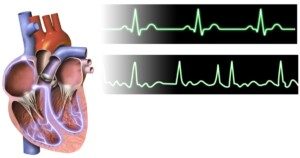
An episode of atrial fibrillation can elevate troponin, but what would be the typical range of this elevation?
Atrial fibrillation (A-fib) is a serious heart rhythm disorder that can have significant consequences if left untreated.
While some patients may not experience symptoms, A-fib poses a major risk due to the potential for blood pooling in the heart.
This stagnation increases the risk of ischemic stroke, particularly in individuals over 65 and those with additional stroke risk factors, such as a family history or smoking.
Additionally, A-fib can lead to elevated levels of troponin, an enzyme released by the heart when the cardiac muscle is damaged.
Elevated troponin levels indicate that the heart is under stress or experiencing damage, further complicating the management of A-fib and its associated risks.

Atrial fibrillation. BruceBlaus
“Some patients with atrial fibrillation develop a fast heart rate (rapid ventricular rate) in the setting of infection, bleeding or other medical conditions,” says Dr. Simon Dixon, chairman of cardiovascular medicine for Beaumont Health System in Michigan.
One such medical condition is coronary artery disease: buildup of fatty deposits inside the arteries.
These arteries supply blood to the heart muscle, and when plaques accumulate, they narrow and harden the arteries, reducing blood flow.
When an episode of A-fib occurs, says Dr. Dixon, “the heart muscle needs greater blood supply to provide oxygen and glucose [blood sugar].
“At times, however, the ‘demand’ outstrips the ‘supply,’ resulting in damage to the muscle (especially on the inside wall of the heart, or subendocardial layer).
“Generally the troponin elevation in these cases is small, for example, 0.1-2.0 ng/mL (the upper limit for the normal range of troponin in our hospital is 0.06 ng/mL).”
This troponin range is called “indeterminate,” because it can have numerous causes other than an episode of atrial fibrillation, but this range isn’t high enough to arouse the suspicion for a heart attack.
Troponin elevation of unknown origin is far more common in elderly people, but should always be followed up.
Age of Patient with Elevated Troponin
The younger a person is, the more significant an elevated result is.
In the younger adult population, elevated troponin levels are less likely to be attributed to age-related conditions and more likely to indicate acute or significant cardiac issues, such as a heart attack or severe heart inflammation.
In contrast, older adults may have elevated troponin levels due to chronic conditions or age-related changes in heart function that are less immediately alarming.
Therefore, in younger adults, an elevated troponin level typically means a more urgent investigation to find out what the cause is.

Dr. Dixon specializes in the treatment of acute and chronic coronary artery disease, with his research focusing on pioneering treatments to save heart muscle in patients who are having heart attacks.
 Lorra Garrick has been covering medical, fitness and cyber security topics for many years, having written thousands of articles for print magazines and websites, and this includes as a ghostwriter. She is also a former ACE certified personal trainer.
Lorra Garrick has been covering medical, fitness and cyber security topics for many years, having written thousands of articles for print magazines and websites, and this includes as a ghostwriter. She is also a former ACE certified personal trainer.
.









































